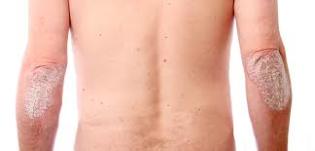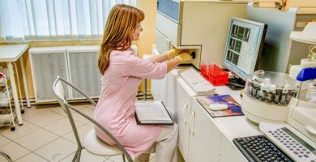Psoriasis is an infectious skin disease is expressed by formation of red, scaly patches covered with itchy, silvery scales. Usually psoriasis develops in young people, the 20 or 30 years. The disease is not a threat to human life, but because her severe suffering of a psychological nature, while the social exclusion.

The causes of the disease
The causes of psoriasis, to date, not fully understood. There are a few factors which are associated with the event of psoriasis. However, in themselves these factors are not able to because psoriasis, just together with each other they can serve as the impetus for the development of this disease:
- genetic predisposition;
- reduces the protective properties of the organism;
- psycho-emotional disorders;
- pathology of the endocrine system.
It is assumed that the psoriasis may be the result of the imbalance of the immune system. The skin accumulates a large number of T-lymphocytes, which leads to the chronic inflammation of the affected areas. Histological examination of arthritis material confirms that the present in high concentrations in immune cells in the affected areas, which allows you to confirm the immunological factors in the development of psoriasis.
Genetic predisposition to psoriasis confirmed the presence of mutations in multiple DNA sites. These areas are responsible for the development of immune cells T-lymphocytes. The failure of such pages that trigger the development of psoriasis. So, if the parents suffer from receiving, the risk of the development of the disease the child is equal to 50% higher. The scientists attribute the development of psoriasis, in adults, the mutations in the specific genes.
Also, because the development of psoriasis can be stress, which leads to aggravation of symptoms. Emotional upset can trigger the release of hormones in the blood, which leads to a series of biochemical reactions, which, in turn, contributes to the appearance of different skin rashes.
The study of the aetiology of psoriasis have shown that many patients with disorders of the endocrine or the reproductive system, in addition, we observed a violation of the process of formation of the pigmentation.
Also to mention the additional factors to the development of psoriasis: ecology, injury, imbalanced nutrition, poor living conditions, violations of basic hygiene.
We can say that psoriasis is hereditary to a specific disease, during the development of a complex of the above reasons.
The symptoms of the disease and its multiple file types to open
Psoriasis some common specific symptoms, to accurately diagnose the disease. When you develop psoriasis, three distinctive States:
- "paraffin" spots that if you try to fight it, the nail, the shell, the consistency of similar wax, stearin;
- red, glossy surface, which is formed after weaning scales, plaques. This is often called the terminal film;
- a very characteristic symptom of psoriasis is a symptom of "blood dew". If you scrape the flakes and plaques on the surface of the skin, to a small bloody points similar to drops of dew.
Most often arthritis lesions local area nyiladékot the large joints, the armpits, scalp, groin, under the Breasts, in the nail. The disease begins with the appearance of little itchy symmetrical rash, then merged with a big conglomerate, occupying large areas of the skin. Itching becomes tolerable, to the separation balance sheet, which is the appearance of the "dew".

Diagnosis of psoriasis causes some difficulties, since there are many types of this disease. Psoriasis the following form:
- vulgaris (common psoriasis);
- the psoriasis plaques;
- acne psoriasis;
- psoriasis flexor surfaces;
- point of psoriasis, or in the form of droplets.
Each type of psoriasis has it's own code, the international rating diseases (ICD-10). Each type of disease has its own signs, symptoms, causes.
The treatment of psoriasis
Psoriasis is much more difficult to manage because the disease is a chronic, of course, provisional, temporary improvement. These days, however, it is possible to significantly improve the patient's condition by reducing the clinical symptoms. Psoriasis treatment is a comprehensive application of common drug therapy, local drug therapy application of physical therapy techniques, immunomodulatory.
Mainly in topical preparations for external use. The composition of these preparations include substances containing:
- Glucocorticosteroid hormones, which prevents the active class of the cells in the skin, and reduces inflammation, itching, the depression, the immune system.
- Drugs based on the vitamin D, the efficiency, which manifests itself in the aperture, ultra-violet radiation.
- Drugs active zinc, which will quickly eliminate the itching, redness of the skin.
The system (common) of psoriasis used to treat:
- Corticosteroids, which eliminate the symptoms of inflammation, regulates the metabolism.
- Cytostatics inhibit uncontrolled cell division.
- Immunomodulatory eliminate dysfunction of the immune system.
- Non-steroidal drugs which treat the symptoms of the disease: inflammation, itching, without, that the disease causes.
Physiotherapy treatment includes several procedures:
- PUVA treatment. This method is the use of photoactive chemical that is used in conjunction with long-wave uv radiation.
- Hirudotherapy. The use of leeches in the treatment of psoriasis, which improves blood flow.
- The cryotherapy. The method consists in using the patient a few minutes in the chamber, a very low temperature. This method helps to eliminate the manifestation of foci of inflammation, and considerably reduce the itch.
The treatment of psoriasis the conventional methods sometimes give good results. Before starting the treatment you need to consult a dermatologist. The doctor should be informed of the methods of treatment, I fully support them.
Complications, and prevention of psoriasis
Complications of psoriasis it looks like severe the diseases, which are very difficult to deal with: psoriatic arthritis, pustular psoriasis, arthritis erythroderma. Prevention of the disease includes the remedial measures:

- sanatorium-resort treatment;
- balanced diet;
- healthy sleep;
- the rehabilitation of chronic foci of infection;
- compliance with hygiene;
- moderate sports.























